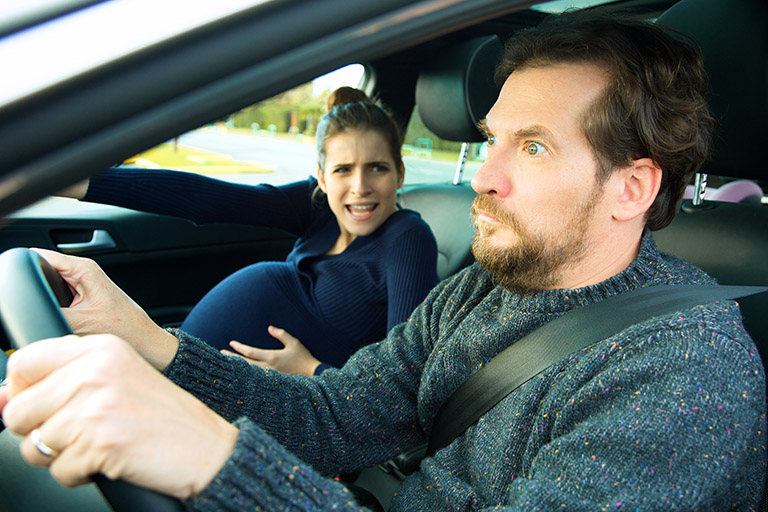
It’s 10:30pm. A Chicago Police Officer hits his lights and pulls over a motorist for speeding on Lake Shore Drive. The officer slowly walks up the window of the vehicle and asks the driver exactly how fast he thinks he was going. After all, the policeman explains, the driver was travelling at over 75 miles in a 40 mile per hour zone which makes it a Class A misdemeanor offense, so the police officer has the right to not only arrest him on the spot, but he could seize his shiny new Subaru as well. But officer! -- he says pointing at the very pregnant woman in the passenger seat -- My girlfriend is ready to give birth at any moment! We’re racing to the hospital! You’ve got to let us go!
But does he? Is what happened here actually a defense? In short, the answer is “maybe”.
What the driver is really talking about here is what in Illinois is referred to as the defense of “necessity”. Under the laws that govern Chicago and all parts of Illinois, our criminal statute basically says that there are some situations when a person may commit an act which is normally a criminal offense but may be excused from responsibility under the law as long as the person:
- 1) is without blame in that he or she didn’t create or contribute to the situation in the first place, and
- 2) reasonably believed that his or her conduct was necessary to avoid a private or public injury, and
- 3) that that injury would have been greater or worse than his or her unlawful conduct.
Accused must be “without blame”
The first part of this law requires that the person didn’t create the situation in the first place. So, for example, consider a defendant who is charged with breaking all the windows in a house so that the people inside didn’t become ill or die from a gas leak. This offense is usually charged as Criminal Damage to Property. Most judges would say that this was probably acceptable behavior because it was a reasonable thing to do in an emergency situation in order to avoid a much great injury to others. But what if the defendant was actually the person who created the bad situation in the first place by turning on the gas as a prank? Then under the law, most judges would likely say that the defense of necessity doesn’t apply under these circumstances.
Accused “reasonably believed such conduct was necessary”
Just like our example about the speeder with the pregnant girlfriend, the potential defense of necessity comes up often in many types of criminal cases, especially those involving traffic and driving. Defendants charged with speeding, reckless driving or driving on a suspended license often ask their attorneys whether such a defense might apply to their particular circumstances such as:
- My baby was sick and I needed to go get medicine at the pharmacy
- My ride to work fell through and I’d be fired if I was late
- My friend was injured and I needed to get him to the hospital
- I was speeding and weaving through traffic to get away from an aggressive driver
When a judge considers whether what the person did was “necessary”, one of the most important considerations is whether there was something else that could reasonably have been done instead to remedy the situation. For instance, did someone need to get to the hospital? Why didn’t you just call an ambulance? Medicine need to be picked up? Was there no other way to get the drugs delivered? Your ride fell through? Why didn’t you call an Uber? Trying to get away from another driver? Why didn’t you just slow down and call the police? All cases are different. Sometimes the defense will apply and sometimes it will not.
Conduct was “necessary” to avoid a greater injury
Even if the defendant was without blame in creating the situation and even if it seemed necessary to take some action which would otherwise have been unlawful to undertake, the defense may still not necessarily apply. That’s because the injury from the specific conduct that is undertaken must be a lesser injury than the one that the defendant was trying to avoid or rescue the other person from.
So, for instance, consider a defendant who is shopping in a grocery store. He sees a careless teenager racing down the aisle with a shopping cart headed straight for a young girl standing alone. Would a judge consider it reasonable to grab the cart out of his hands? Or even to push the teenager away or knock the cart over to save the girl from injury? Probably yes. But what if the shopper pulled out his concealed carry weapon and shot the teenager in the leg to stop the little girl from being injured? The answer would almost assuredly be “no” as the harm caused was disproportionate to the harm saved. Each case is different.
Experienced Attorneys Can Advise You of Possible Defenses
When charged with a crime, whether felony, misdemeanor or local ordinance, consult an experienced lawyer to determine whether there are any defenses that may apply to your case. The legal team at Sexner & Associates LLC can be contacted at (800) 996-4824 or online.
This blog is available for informational purposes only and is not considered legal advice on any subject matter. The blog should not be used as a substitute for legal advice from a licensed professional attorney, and readers are urged to consult their own legal counsel on specific legal questions.

